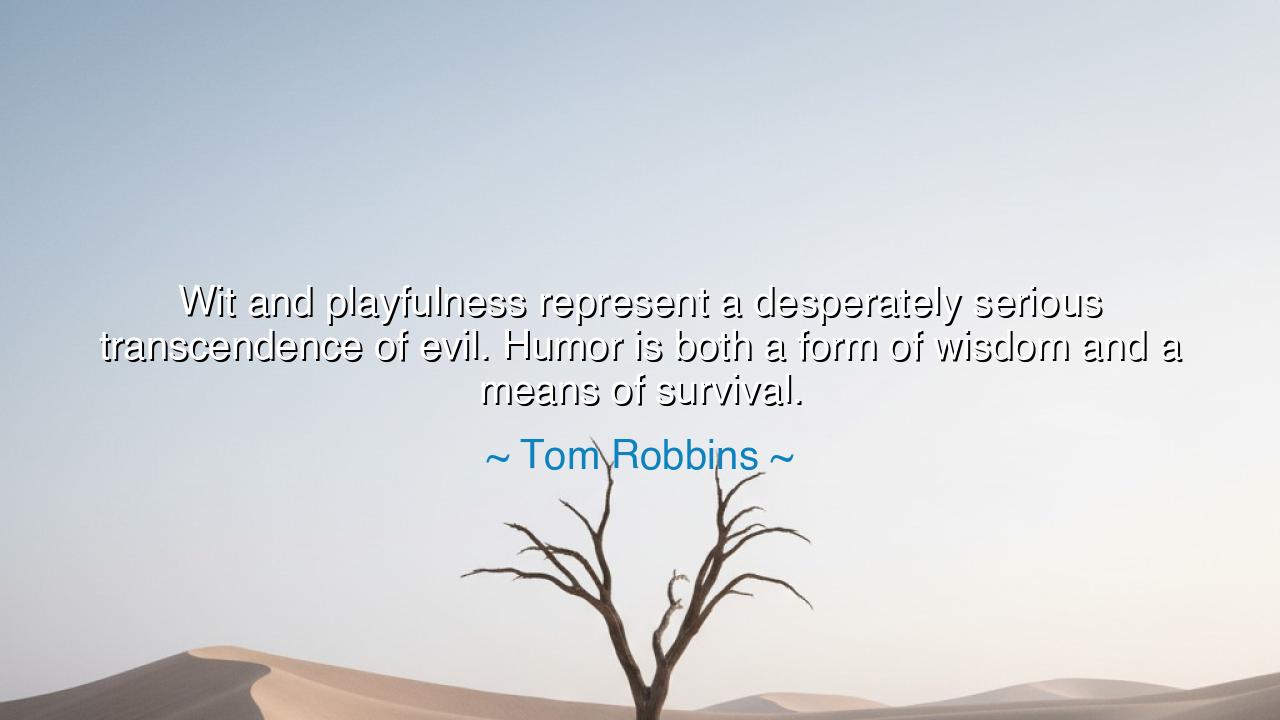
Wit and playfulness represent a desperately serious transcendence
Wit and playfulness represent a desperately serious transcendence of evil. Humor is both a form of wisdom and a means of survival.






The words of Tom Robbins, “Wit and playfulness represent a desperately serious transcendence of evil. Humor is both a form of wisdom and a means of survival,” are carved from the very heart of human endurance. They speak to the paradox of laughter — that the lightness we summon in the face of darkness is not frivolity, but defiance; not escape, but transcendence. Robbins, a writer whose stories dance on the line between absurdity and revelation, understood that humor is not a denial of suffering, but a weapon forged in its fire. To laugh in the shadow of despair is to declare, “You may wound me, but you will not define me.”
From the earliest days of humankind, the wise have known that wit is a shield against chaos. When the storms of cruelty and injustice rise, laughter becomes the last unbroken fortress of the soul. The philosophers of ancient Greece — those who lived through tyranny and war — called laughter a form of catharsis, a cleansing of the spirit. Even the stoic Epictetus, once a slave, taught that the ability to smile at misfortune was the mark of the free mind. For laughter restores perspective; it reminds us that we are not swallowed by the world’s evils, but remain sovereign over our inner realm.
When Robbins speaks of “playfulness” as a “desperately serious transcendence,” he reveals one of life’s greatest paradoxes: that joy, when chosen consciously, is the most profound act of resistance. The child’s spirit, the trickster’s grin, the artist’s whimsy — these are not naive indulgences, but sacred powers. They allow us to reimagine a world that cruelty has sought to harden. The tyrant and the cynic cannot bear laughter, for it exposes their impotence. In humor lies the courage to say: “You do not own my imagination. I still see beauty, I still see possibility.”
Consider the story of Viktor Frankl, the psychiatrist who survived the death camps of Nazi Germany. Amidst starvation, brutality, and death, he found a strange truth: those who could still laugh, even for a moment, preserved something untouched by horror. A joke whispered among prisoners, a moment of irony at the absurdity of suffering — these were not trivial. They were sacred sparks of human dignity. Frankl later wrote, “Humor, more than anything else in the human make-up, can afford an aloofness and an ability to rise above any situation.” Thus, humor became a form of wisdom, a spiritual strategy by which the soul refused to bow to despair.
Throughout history, the jester and the fool have carried this same torch. In medieval courts, when kings were surrounded by flatterers and fear, it was the fool — armed with humor — who could speak truth without punishment. Cloaked in laughter, the fool revealed wisdom that the wise dared not speak. His mockery became medicine, his laughter a mirror reflecting power’s corruption. The fool’s wit was not foolishness, but bravery disguised in jest — a reminder that humor, when wielded with purpose, can cut deeper than any blade.
Humor, then, is a sacred wisdom — the wisdom of proportion, of perspective, of survival. It does not erase pain, but transforms it. It allows the heart to bend without breaking. Those who have suffered deeply often find in laughter a hidden strength; for where tears cleanse, laughter revives. In every age, when darkness has grown too heavy, it has been humor — the poet’s irony, the rebel’s jest, the child’s laughter — that kept the world from collapsing under its own grief. To laugh sincerely is to say: “I still believe in life.”
So let this be the teaching: guard your humor as you would guard your soul. When sorrow visits, do not let bitterness make you silent; let wit lighten your burden. When evil seeks to crush your spirit, answer it not with despair, but with laughter — fierce, unyielding, and full of grace. Be playful even in struggle; for play is the movement of the free. Remember always that to smile in the face of darkness is not weakness, but mastery. It is the spirit rising above the weight of the world.
And as Tom Robbins teaches, let your wit be sharp, your humor compassionate, and your playfulness courageous. For these are not ornaments of joy — they are instruments of survival, the music of souls that will not be subdued. When you can still laugh amidst the ruins, when you can find lightness in the heaviest of days, then you have transcended evil itself — and in doing so, you have remembered what it truly means to be human.






AAdministratorAdministrator
Welcome, honored guests. Please leave a comment, we will respond soon